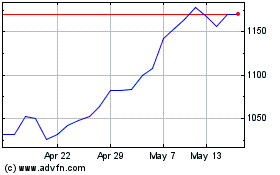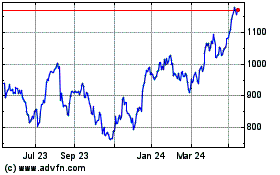U.K. House Market Cools in April
May 11 2016 - 7:40PM
Dow Jones News
LONDON—The U.K. housing market cooled in April for the first
time in over a year, a fresh sign that uncertainty over the outcome
of a coming referendum on Britain's membership of the European
Union is weighing on the economy.
The Royal Institution of Chartered Surveyors said Thursday in a
survey of more than 300 of its members that demand for homes in
April fell, with the percentage of surveyors reporting a decline in
new-buyer inquiries exceeding those reporting an increase by 22
points, the widest margin since March 2015.
The institution, which trains and accredits real estate
surveyors world-wide, said the fall in demand was visible across
the U.K. and in part reflects extra caution among home buyers ahead
of the referendum June 23.
"Uncertainty is a word that features heavily in the feedback we
are receiving from members," said RICS Chief Economist Simon
Rubinsohn.
Higher property-transaction taxes introduced last month have
also dented demand, Mr. Rubinsohn said. On April 1, a change to
U.K. stamp duty added an additional 3% on buyers of second homes
and rental properties.
Britain's market for high-end homes saw a spike in activity
ahead of the new tax, according to U.K. real-estate broker Savills
PLC. "Since then, the volume of activity has moderated, as we
anticipated, in advance of the referendum," Savills said in a
statement Wednesday.
The debate over the U.K.'s future in Europe stepped up a gear
this week, with senior figures on both sides setting out their
stall on what so-called "Brexit" might mean for the economy,
Britain's influence in the world and its national security.
Polls show the public is split on whether to stay in the
28-member union or go it alone.
The economy has become a key battleground in the opposing
campaigns, with supporters of Brexit arguing that Britain would be
richer if it dumped onerous EU regulation and pursued new
free-trade deals with fast-growing parts of the world.
Arrayed against them are institutions including the Organization
for Economic Cooperation and Development, the International
Monetary Fund and the U.K. Treasury, all of which warn leaving the
EU would probably make Britain poorer than staying in the 28-member
union.
Bank of England officials have said weakening business
investment and slipping consumer confidence are among the signs
that the economy is slowing ahead of the vote, as businesses and
consumers put spending plans on hold until after the result is
known.
Commercial property investors have paused ahead of the vote,
with U.K. transaction volumes in the first quarter at £ 10.9
billion down 43% from the same period in 2015, according to
data-provider Real Capital Analytics. Property chiefs have warned
that a vote to leave the EU could cause commercial property values
to fall, especially in London.
In the housing market, RICS expects prices to keep rising
despite the dip in demand, given a shortage of new homes.
Write to Jason Douglas at jason.douglas@wsj.com and Art Patnaude
at art.patnaude@wsj.com
(END) Dow Jones Newswires
May 11, 2016 19:25 ET (23:25 GMT)
Copyright (c) 2016 Dow Jones & Company, Inc.
Savills (LSE:SVS)
Historical Stock Chart
From Jun 2024 to Jul 2024

Savills (LSE:SVS)
Historical Stock Chart
From Jul 2023 to Jul 2024
